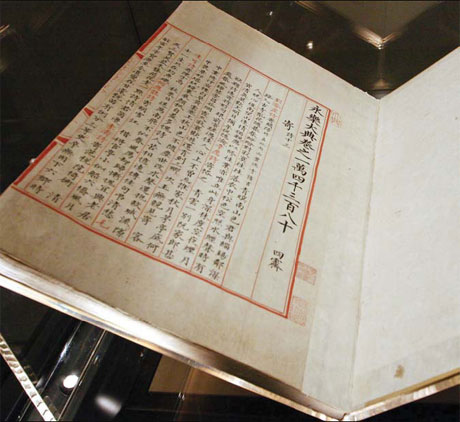Loyalty to the throne
Updated: 2012-10-05 07:16
(China Daily)
|
|||||||||||
|
The Yongle Emperor commissioned the compilation of the world's earliest and greatest encyclopedia, The Yongle Canon. Provided to China Daily |
This talk examines the discourse on imperial authority and dynastic loyalty in late imperial China. Its focus is the veneration and commemoration of the loyalists who died serving Emperor Jianwen (1377-1402), whose throne was usurped in 1402.
Emperor Yongle (1360-1424) seized the throne from his nephew and then elided the history of his reign. Yongle then proceeded to become one of the most powerful and influential rulers of the dynasty, moving the capital to Beijing, projecting Ming power from Mongolia to the Indian Ocean, and consolidating the neo-Confucian curriculum of the civil service examinations.
Despite Yongle's imposing legacy, the practice of venerating these loyalists began shortly after his death, spreading across the empire and continuing down to the present day.
The persistent and widespread nature of this veneration and the debates it inspired indicate a significant and evolving tension in the definition and negotiation of loyalty to the throne in late imperial China.
Date: Oct 8
Venue: Russell Square: College Buildings Room: G50
Website: www.soas.ac.uk
(China Daily 10/05/2012 page37)
Today's Top News
Rescuers race against time for quake victims
Telecom workers restore links
Coal mine blast kills 18 in Jilin
Intl scholarship puts China on the map
More bird flu patients discharged
Gold loses sheen, but still a safe bet
US 'turns blind eye to human rights'
Telecom workers restore links
Hot Topics
Lunar probe , China growth forecasts, Emission rules get tougher, China seen through 'colored lens', International board,
Editor's Picks

|

|

|

|

|

|






